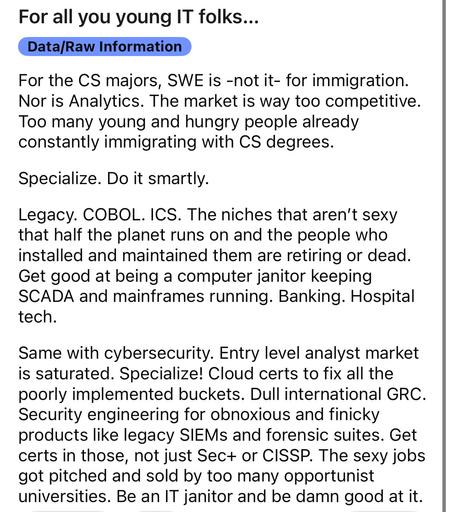Free course: Announcing Learning COBOL Programming with VSCode - IBM Learning Blog
You can take this 16 hour course for free and earn your badge. Get set and dive in for some actual COBOL! This introductory COBOL course helps a novice learn the Structure of COBOL programs, Data types & Variable Handling, Intrinsic Functions, Branching logic and more. The goal of the course is to enable the […]
@hacks4pancakes @jennasmith @xgebi
It's still widely used in the financial space and quite a lot of legacy banking still runs on mainframes 🦕
@jennasmith @hacks4pancakes @xgebi it's reliable (lots of overnight batches etc) so used as systems of record - ledgers/customer records and the like but there will be a lot of plumbing between them and the internet facing bit that is your banking app/Internet Bank website.
But being old and reliable means that a large amount of tech debt has built up so migrating to a more modern platform is quite a large undertaking.
@jennasmith @IckleAndy @hacks4pancakes @xgebi
It's flat out _terrible_.
But it is the implementation of enormous quantities of critical infrastructure. Banking. Public services. We're talking multi-million line codebases that underpin society.
You stick your card in an ATM, at some point, COBOL will be involved.
@jennasmith @IckleAndy @hacks4pancakes @xgebi
And because most of these codebases predate modern development practices, they don't have automated tests, specifications, or often even version control that'd you'd recognise.
The system itself is the spec. Porting it to something else is a hard hard option. And taking it offline while you wait for something else probably isn't either.
Guess we might find out what that looks like soon if the DOGEbois get their paws on one of these systems.

